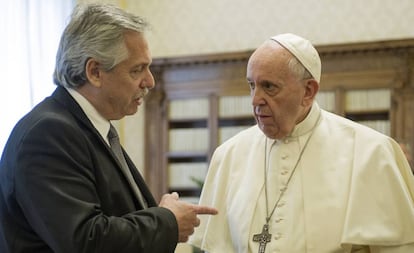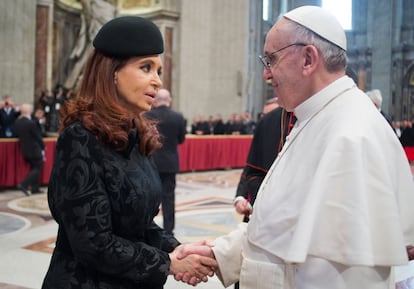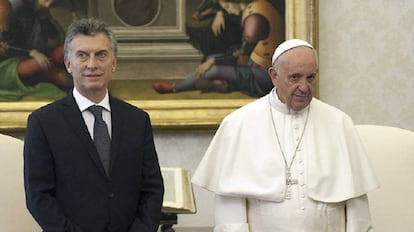Pope Francis, the Latin American pontiff who resists going home
After 10 years as head of the Catholic Church, Jorge Bergoglio’s relationship with Argentina is marked by domestic politics and his alleged ties to Peronism


“See you when I get back,” he told Father Jorge Russo, rector of the Metropolitan Cathedral on February 26, 2013 when, as Cardinal, he was leaving Buenos Aires for Rome to participate in the papal conclave that would elect a successor to Benedict XVI. But once he became Pope Francis, he never made it back.
The delay of an official visit to Argentina has been fodder for all kinds of political speculation back home, and is now reactivated by the 10th anniversary of his papacy.
Argentinians see Francis as one of their own and tend to place him at the center of the country’s politics. For the past 10 years, every message from the Vatican has been analyzed in Buenos Aires, measuring the extent of a smile with various politicians or a certain gesture made to a former president. It started back on March 13, 2013. A “Peronist Pope” had taken up residence in the Vatican.
“I was never affiliated to the Peronist party,” Pope Francis is quoted saying in the recently published book El Pastor (or The Shepherd), by journalists Sergio Rubin and Francesca Ambrogetti. “I was not even a militant or sympathizer of Peronism. To claim that is a lie. My writings on social justice led to the assumption that I am a Peronist. But regarding the theory of having a Peronist perception of politics, what would be wrong with that?”
Sergio Rubin stresses: “He may be sensitive to the original pillars of Peronism, those of social justice and helping the poor, but this issue of him being a sectarian Peronist who doesn’t like [former liberal president Mauricio] Macri is just local politics.”
Meanwhile, historian Marcelo Larraquy, author of Francisco Code, explains that Bergoglio’s alignment to Perón’s doctrine “is based on the relationship between the theology of the people and Peronism. The theology of the people, which was removed from Marxist liberation theology in Latin America in the 1970s but not in Argentina, understood that the people already had their faith and wisdom and the priest had to accompany that faith with the Gospel.”

When based in Buenos Aires, Cardinal Bergoglio maintained a tense relationship with Presidents Néstor and Cristina Kirchner. It was, according to Larraquy, “a problem of leadership – the voice of the political leader and that of the religious leader.” The relationship changed in 2013, when Cristina Kirchner understood that, as president, it was not a good idea to fight with the Pope. She traveled to Santa Marta and had a long meeting with him. “Kirchner was told not to even think of messing with the Pope, and she did what she had to do,” says Rubin. “But the story doesn’t end well, because she started abusing the relationship and Francis doesn’t like to be used.”
When Mauricio Macri became president of Argentina in 2015, a photo of Pope Francis looking annoyed after a 22-minute meeting perfectly captures the nature of their relationship, which was tense, partly because “people like Marcos Peña [head of the Cabinet of Ministers] told Macri to stay away from the Pope to show himself to be progressive,” says Rubin. Alberto Fernández rushed to visit the Pope as soon as he took office in 2019, but the president’s insistence on proclaiming Francis little short of a personal advisor to his government ended up cooling the relationship. The nail in the coffin came in December 2020 with the approval of legal abortion in Argentina.

“Francis is aware of the political use made of him in Argentina and believes that there is a lot of political manipulation, but he is talking about attitudes, not about people,” says Rubin. Are the conditions right for him to finally make a trip home? Francis himself said in a recent interview with Infobae that “it’s possible,” but only once the October general elections are over. “Trips are not made to countries during election periods to avoid them being used by the ruling party for reelection purposes. But I want to go to Argentina,” he said.
The reason he hasn’t been back in 10 years is that “he didn’t want to get caught in the crack of those conservative Catholics who would somehow reprimand him for being close to the poor,” says Larraquy. According to Rubin, the visit would have been possible during the first months of his papacy, but then it was too late. “His visit would cause tremendous controversy,” he says. “Politically, he wants to contribute to unity and coming could be divisive.”
“We trust in your wisdom to say yes and when”
Argentinian politicians are not resigned. On March 13, on the occasion of the 10th anniversary of his papacy, they sent Francis a letter expressing “admiration” for his work with the poor. The letter was signed by President Alberto Fernández and Vice-President Cristina Kirchner, as well as opposition leaders such as the head of government of Buenos Aires, Horacio Rodríguez Larreta, and the former governor María Eugenia Vidal, besides 13 current regional governors, trade unionists and leaders of social movements, many who only speak to each other via confrontations in the media. Former President Mauricio Macri did not sign, although signatures are still being gathered.
Other than Macri, all were miraculously united in their request for the Pope to visit Argentina. “We know how much resistance your work generates among those who may see their illegitimate interests affected,” says the letter. “But we look forward to your visit and trust in your wisdom to say yes and eventually when.” Argentines will have to wait at least until after the presidential elections.
Sign up for our weekly newsletter to get more English-language news coverage from EL PAÍS USA Edition
Tu suscripción se está usando en otro dispositivo
¿Quieres añadir otro usuario a tu suscripción?
Si continúas leyendo en este dispositivo, no se podrá leer en el otro.
FlechaTu suscripción se está usando en otro dispositivo y solo puedes acceder a EL PAÍS desde un dispositivo a la vez.
Si quieres compartir tu cuenta, cambia tu suscripción a la modalidad Premium, así podrás añadir otro usuario. Cada uno accederá con su propia cuenta de email, lo que os permitirá personalizar vuestra experiencia en EL PAÍS.
¿Tienes una suscripción de empresa? Accede aquí para contratar más cuentas.
En el caso de no saber quién está usando tu cuenta, te recomendamos cambiar tu contraseña aquí.
Si decides continuar compartiendo tu cuenta, este mensaje se mostrará en tu dispositivo y en el de la otra persona que está usando tu cuenta de forma indefinida, afectando a tu experiencia de lectura. Puedes consultar aquí los términos y condiciones de la suscripción digital.








































